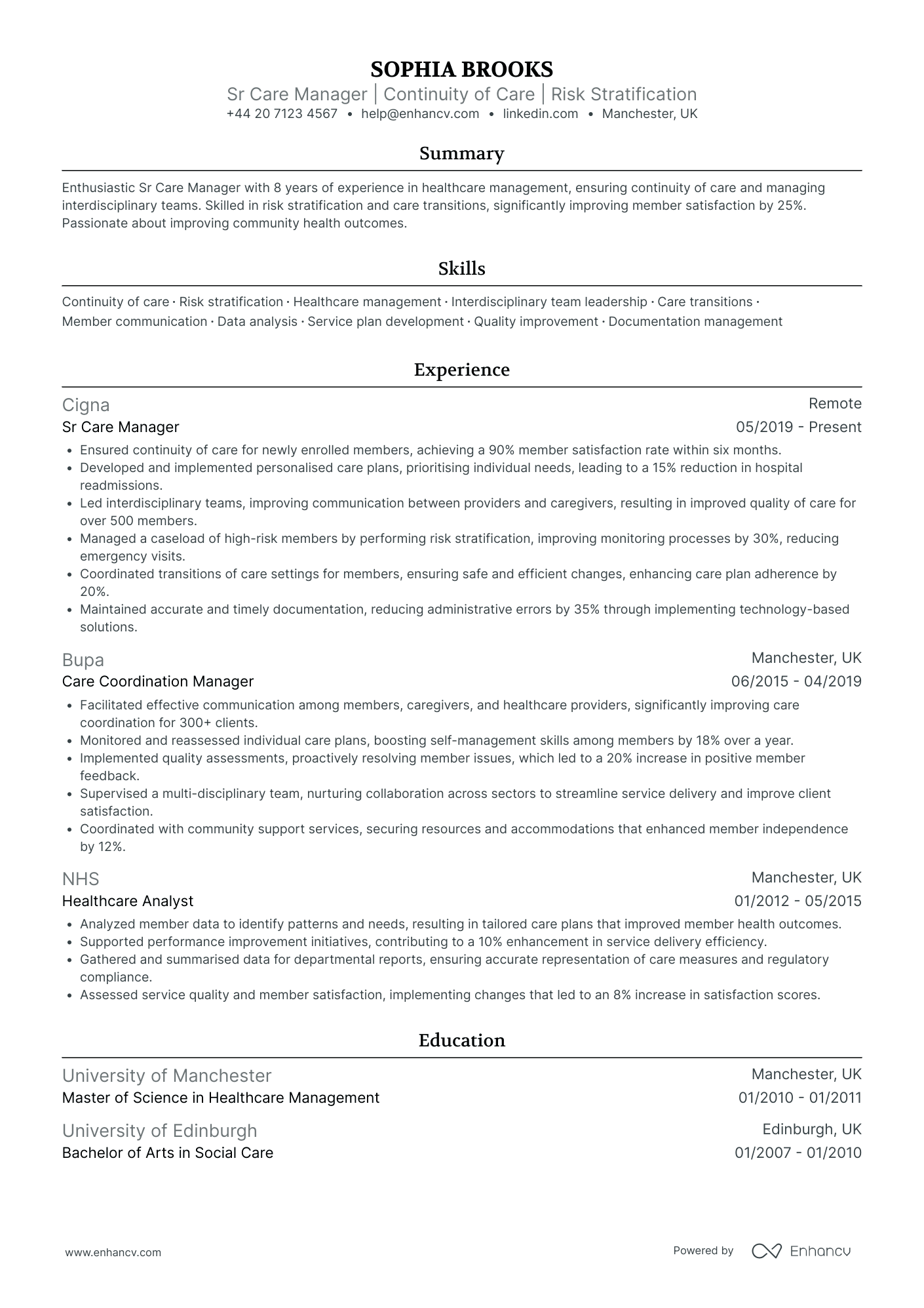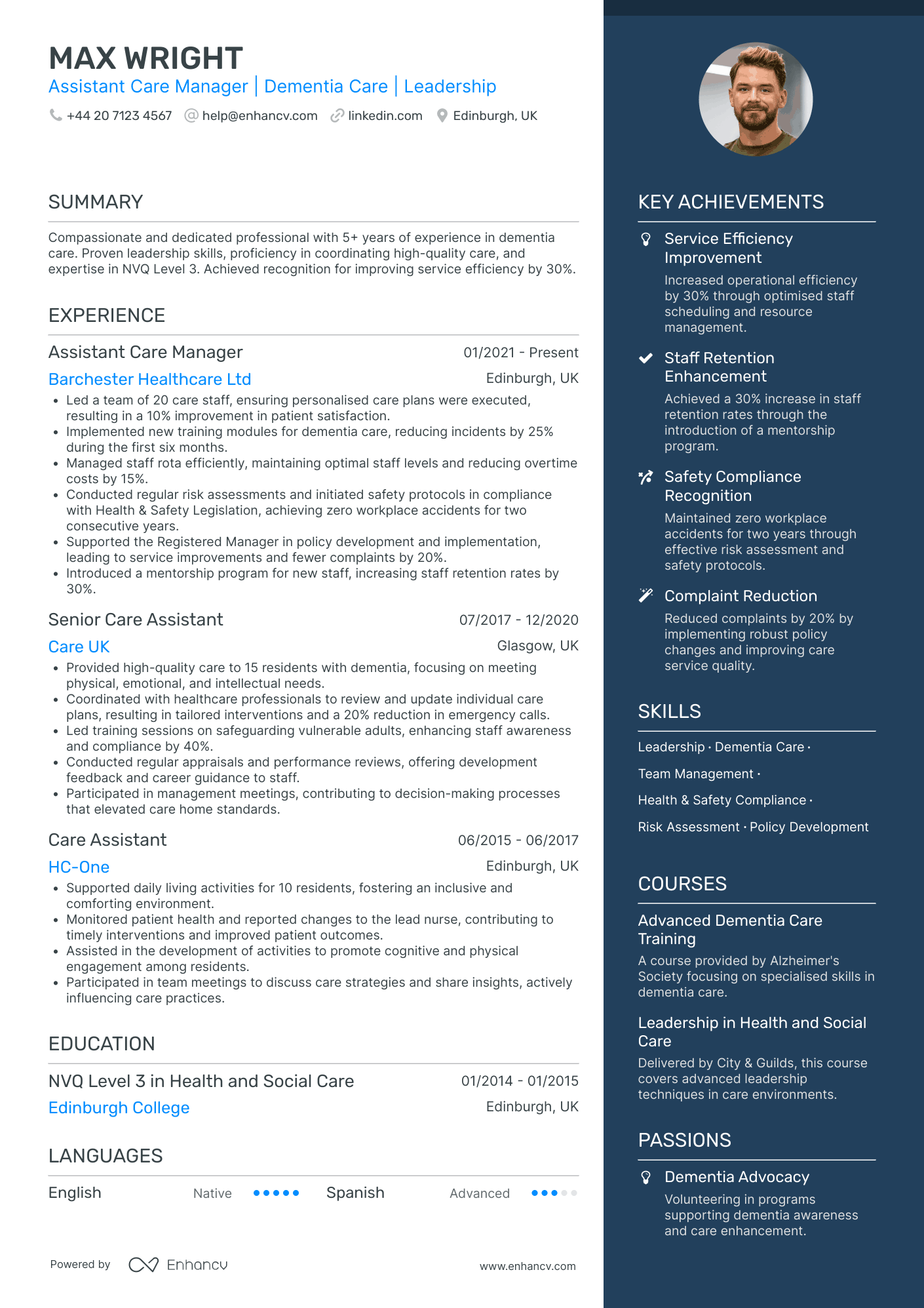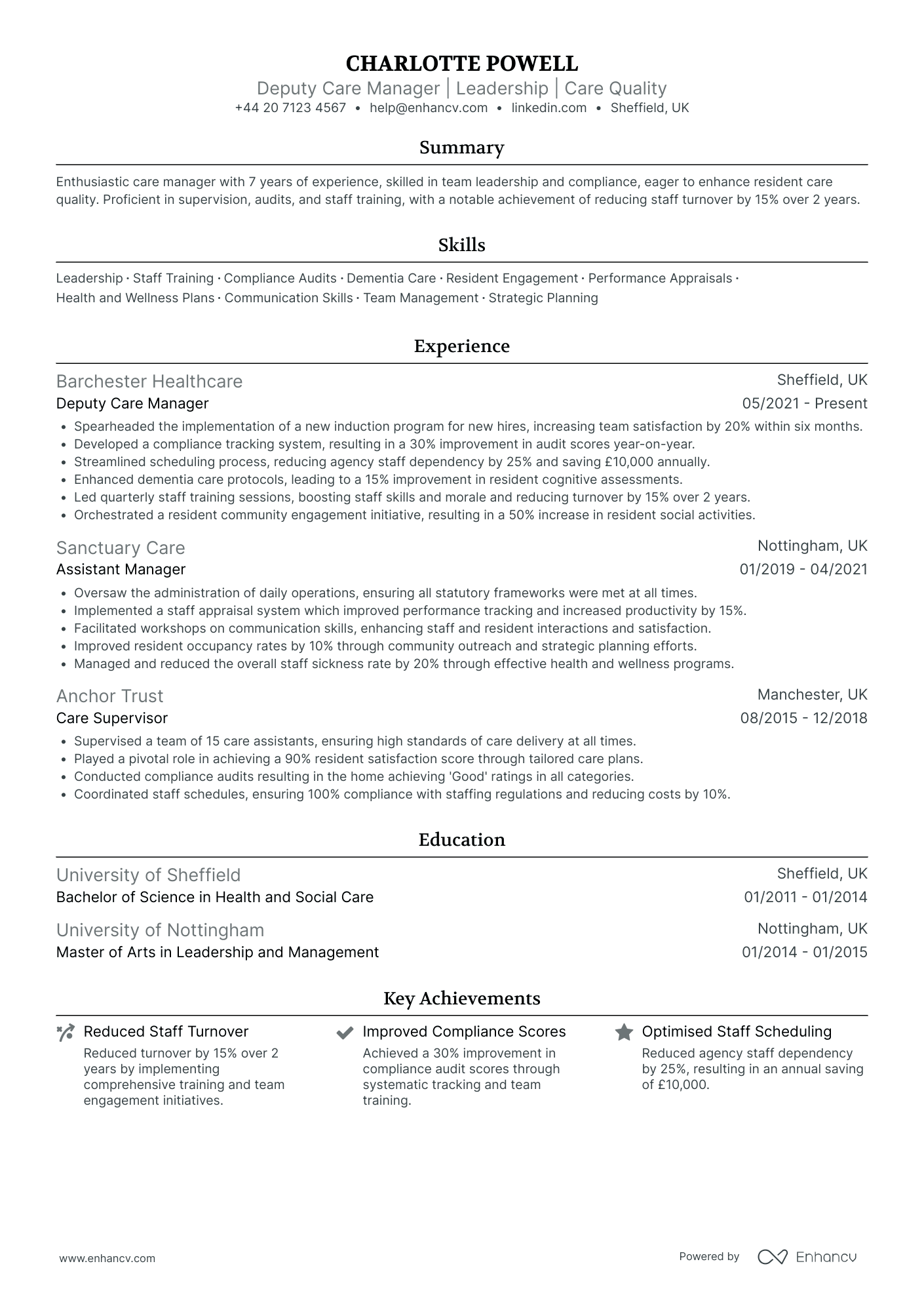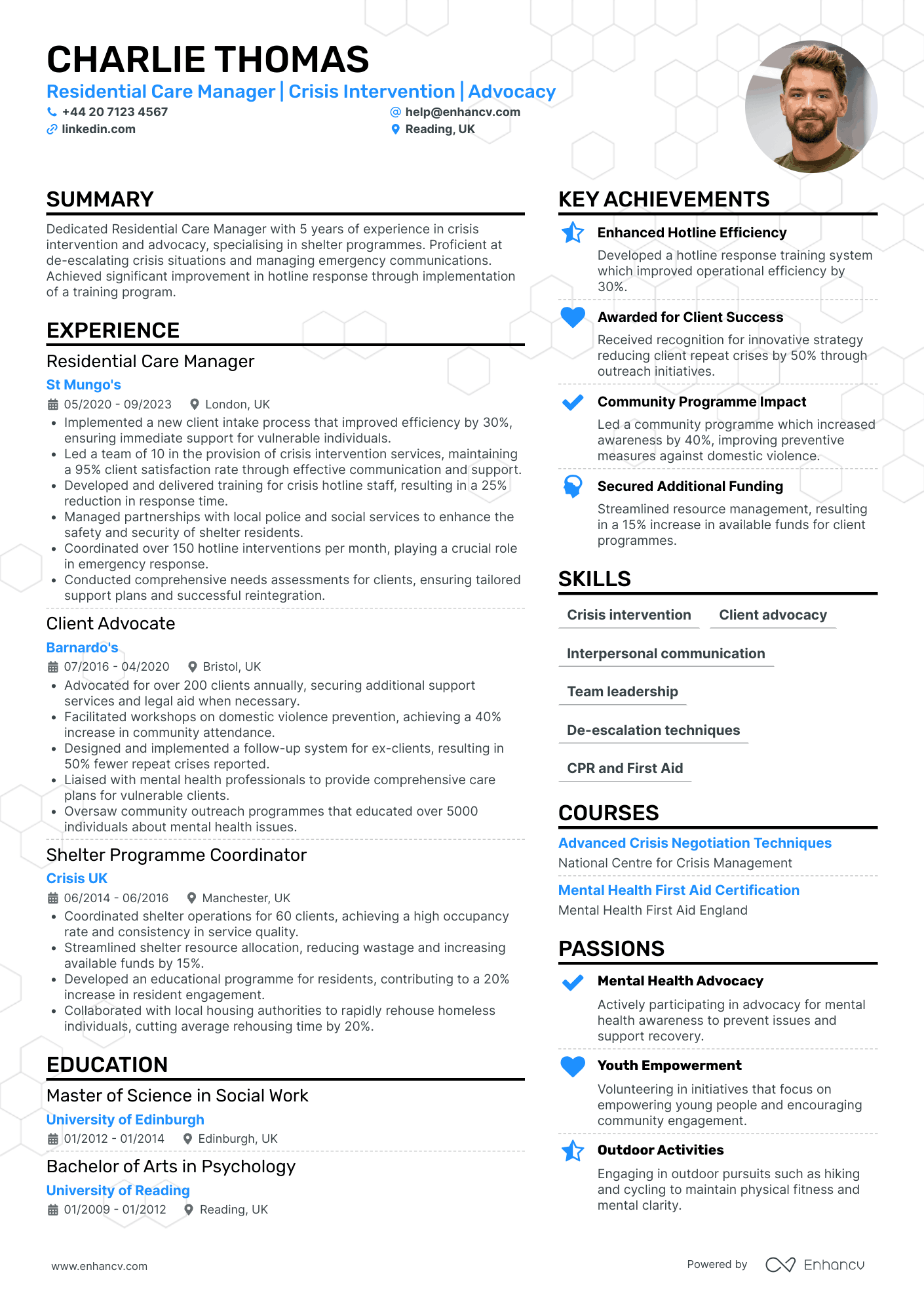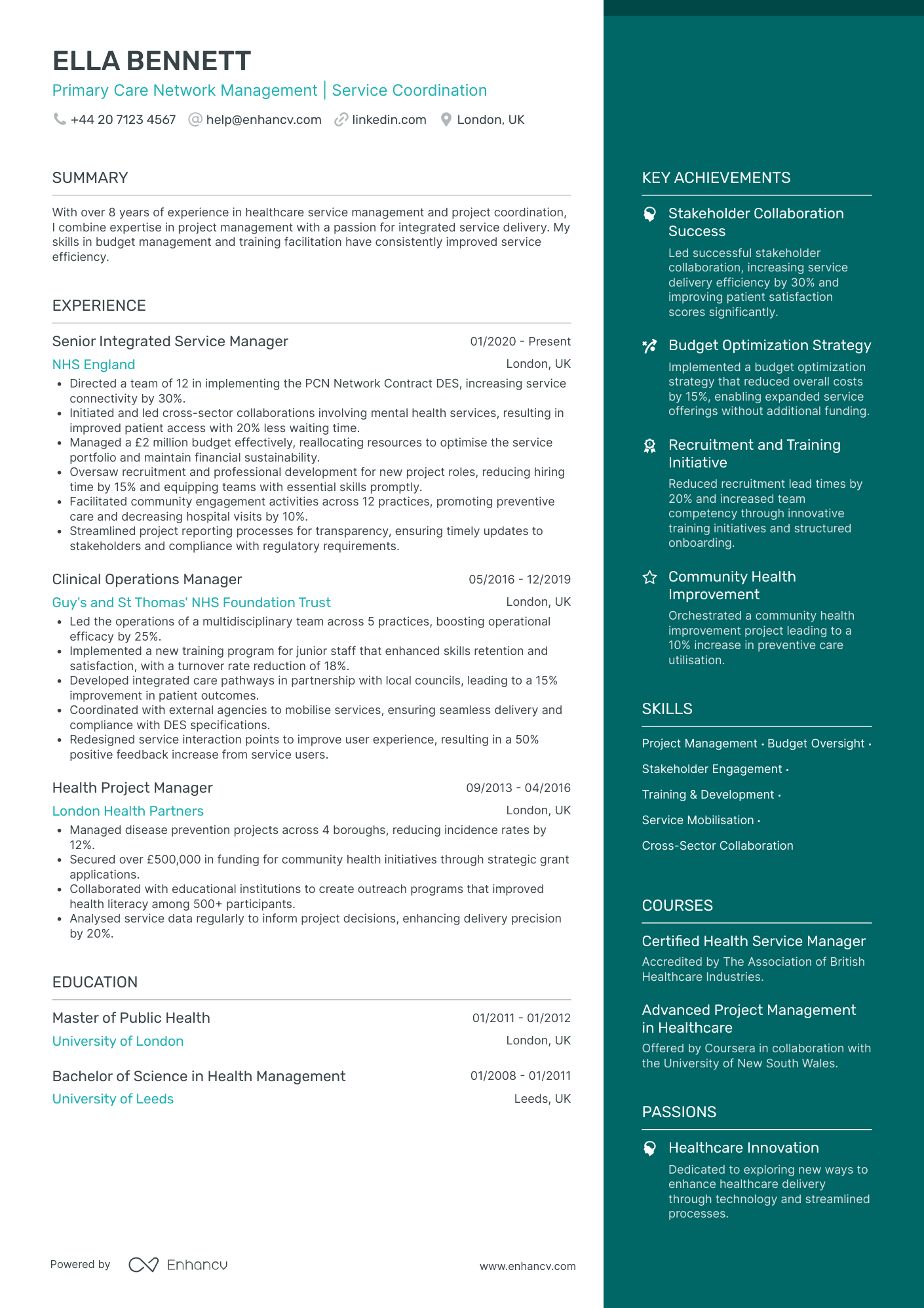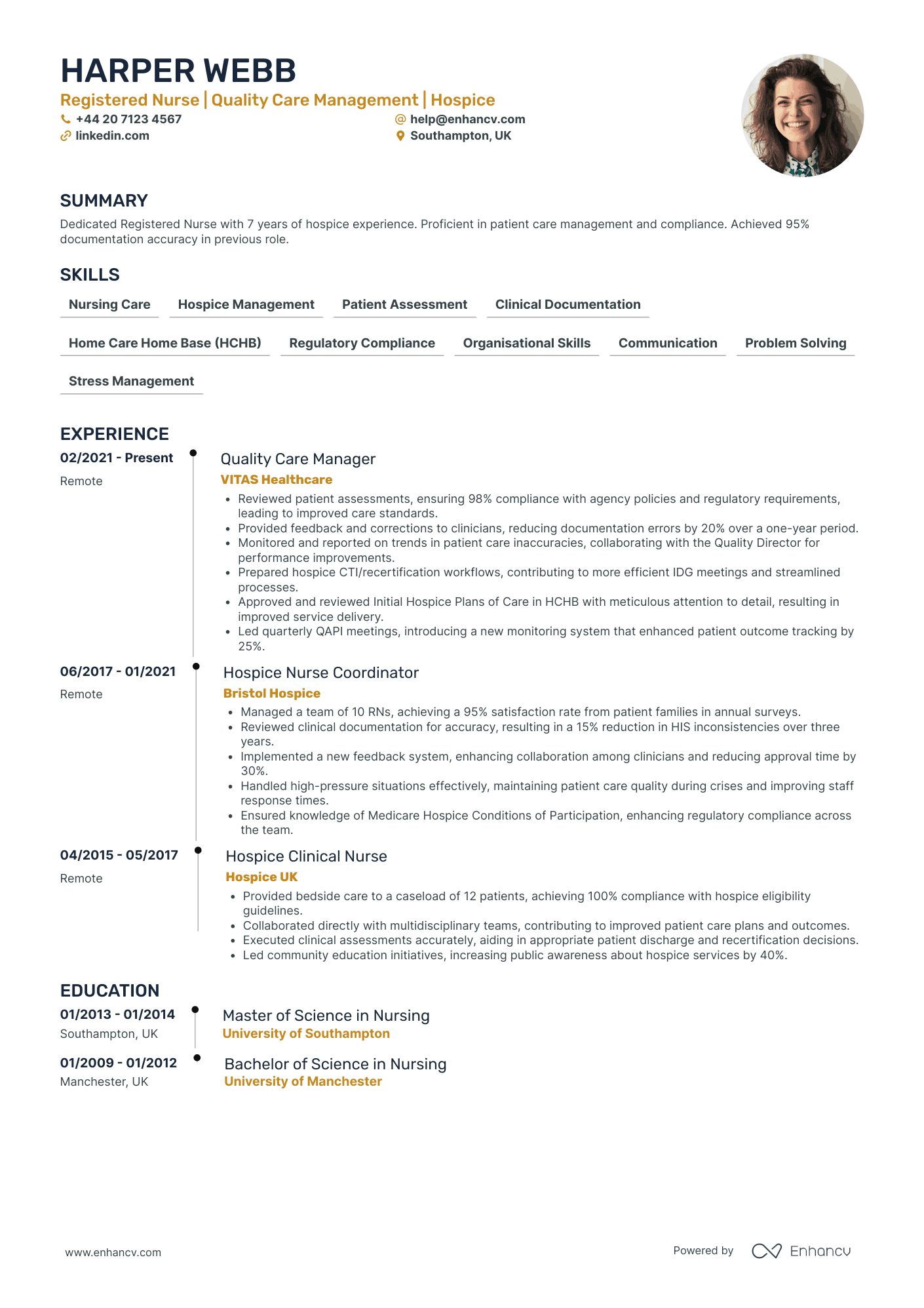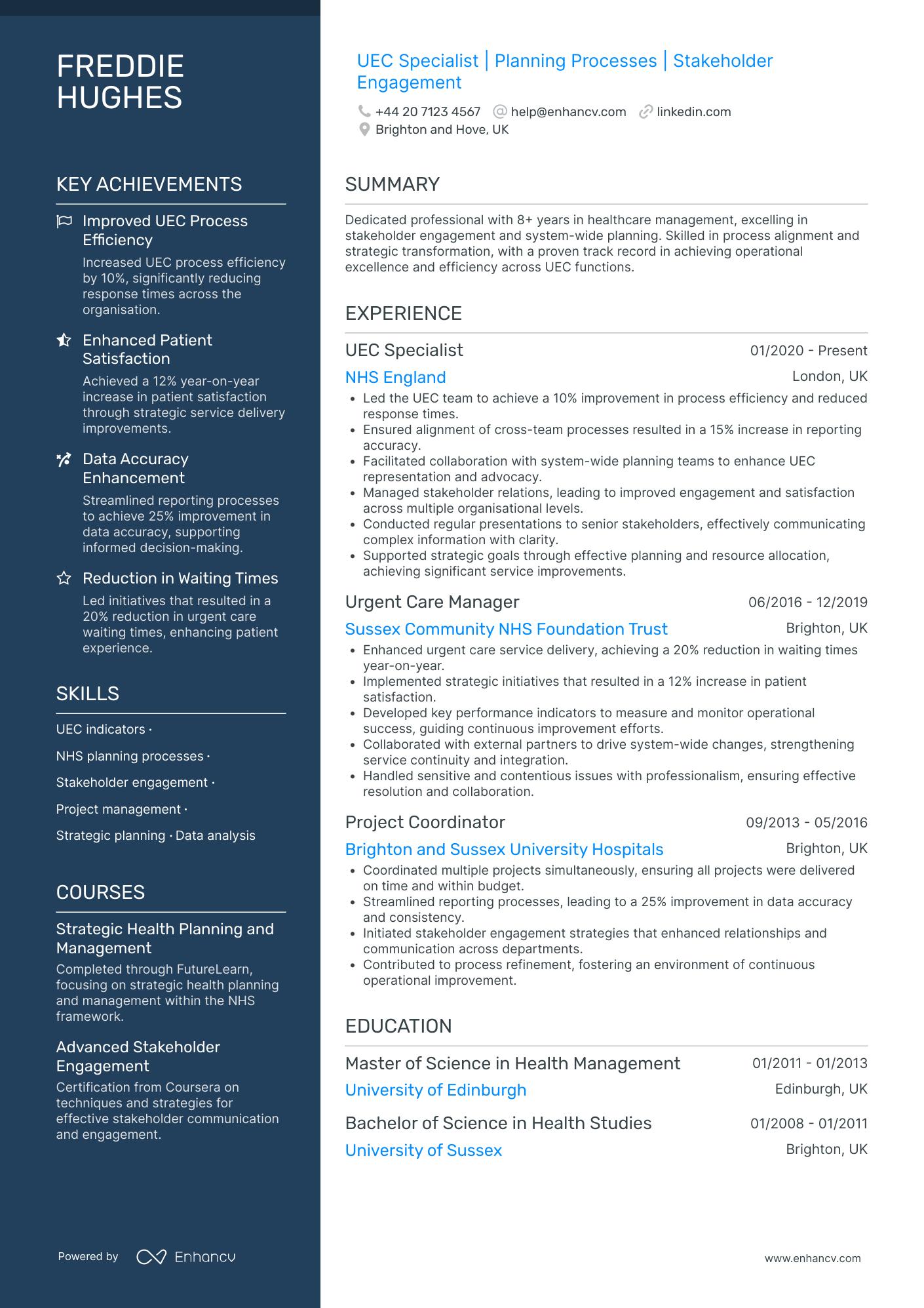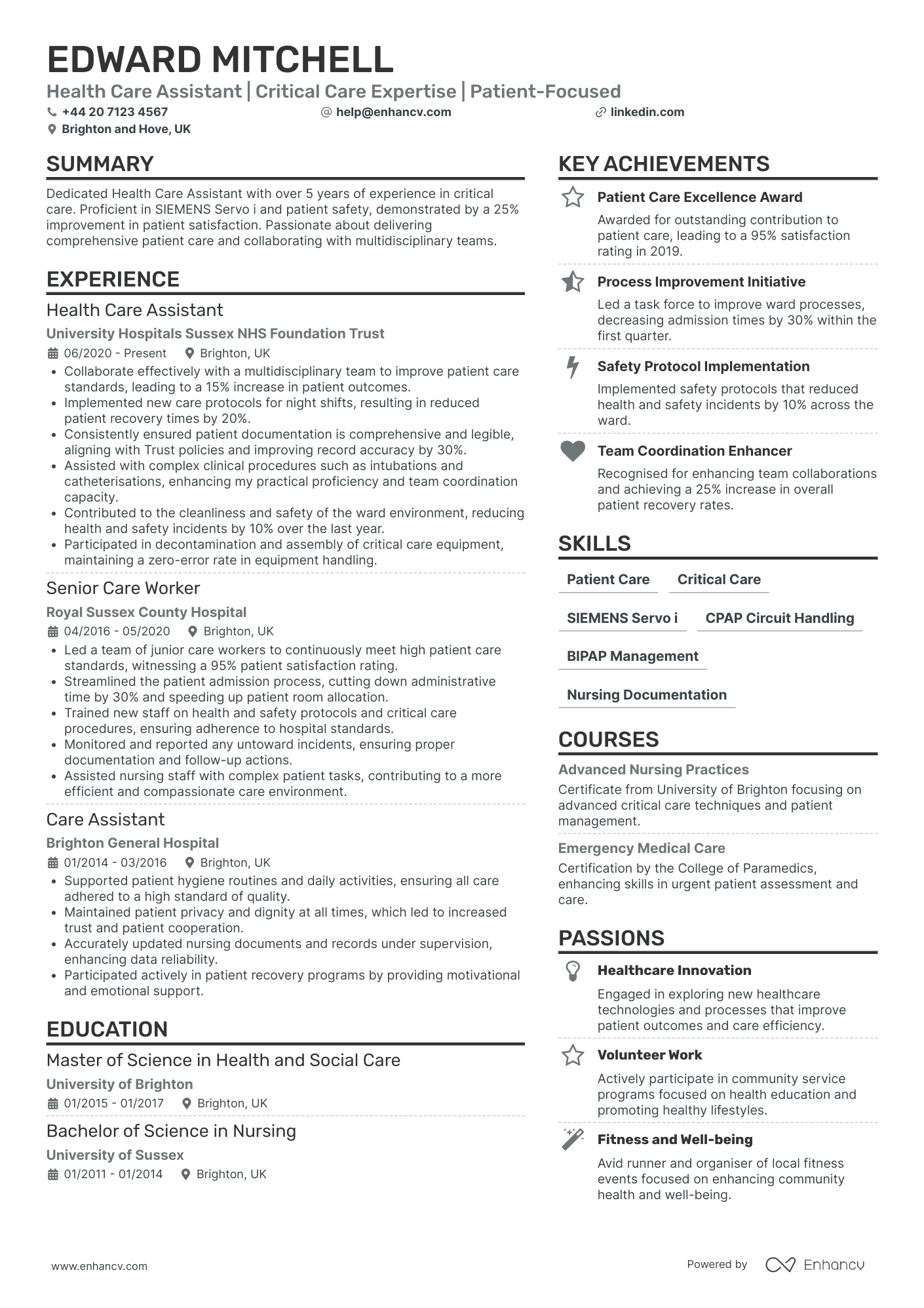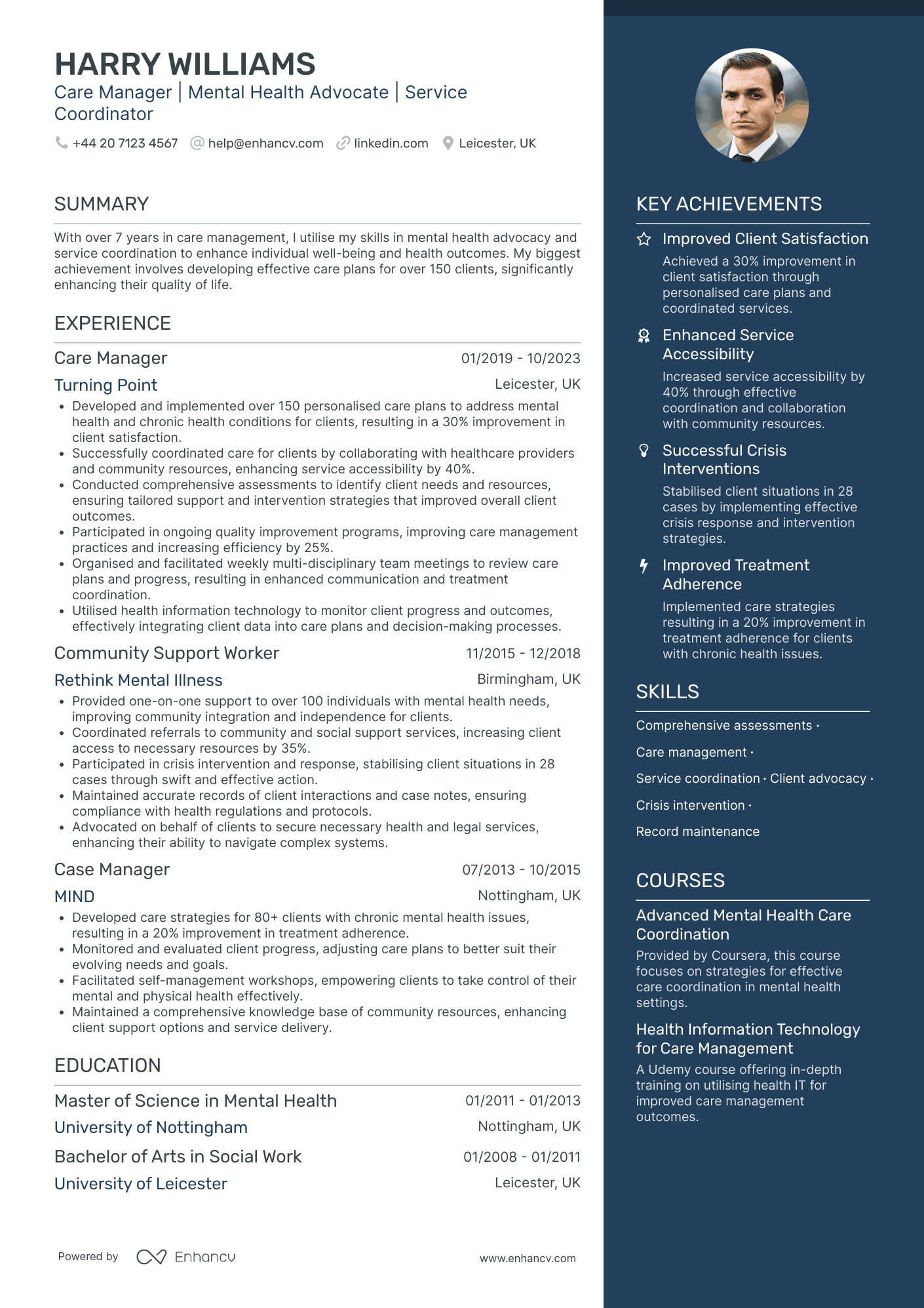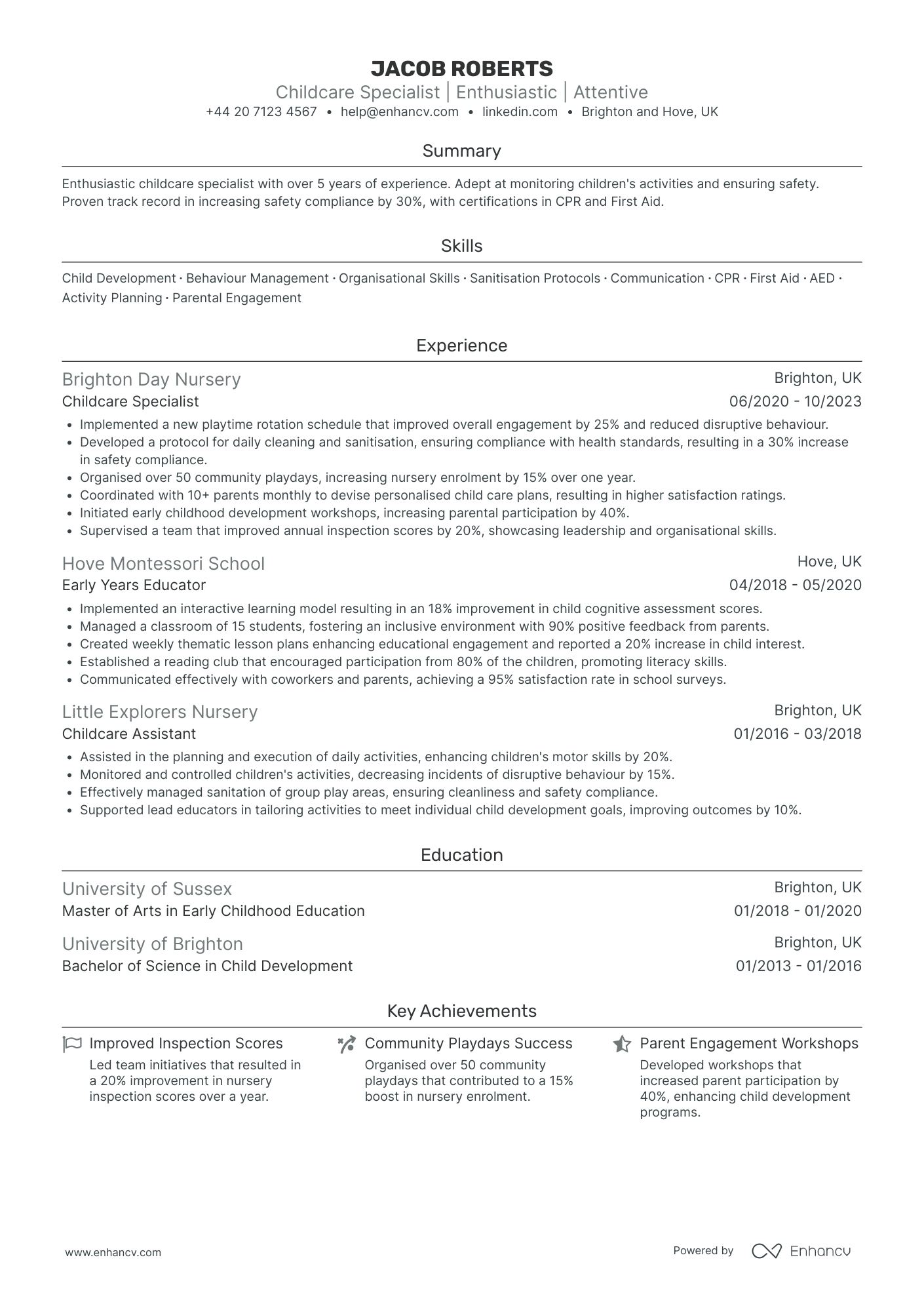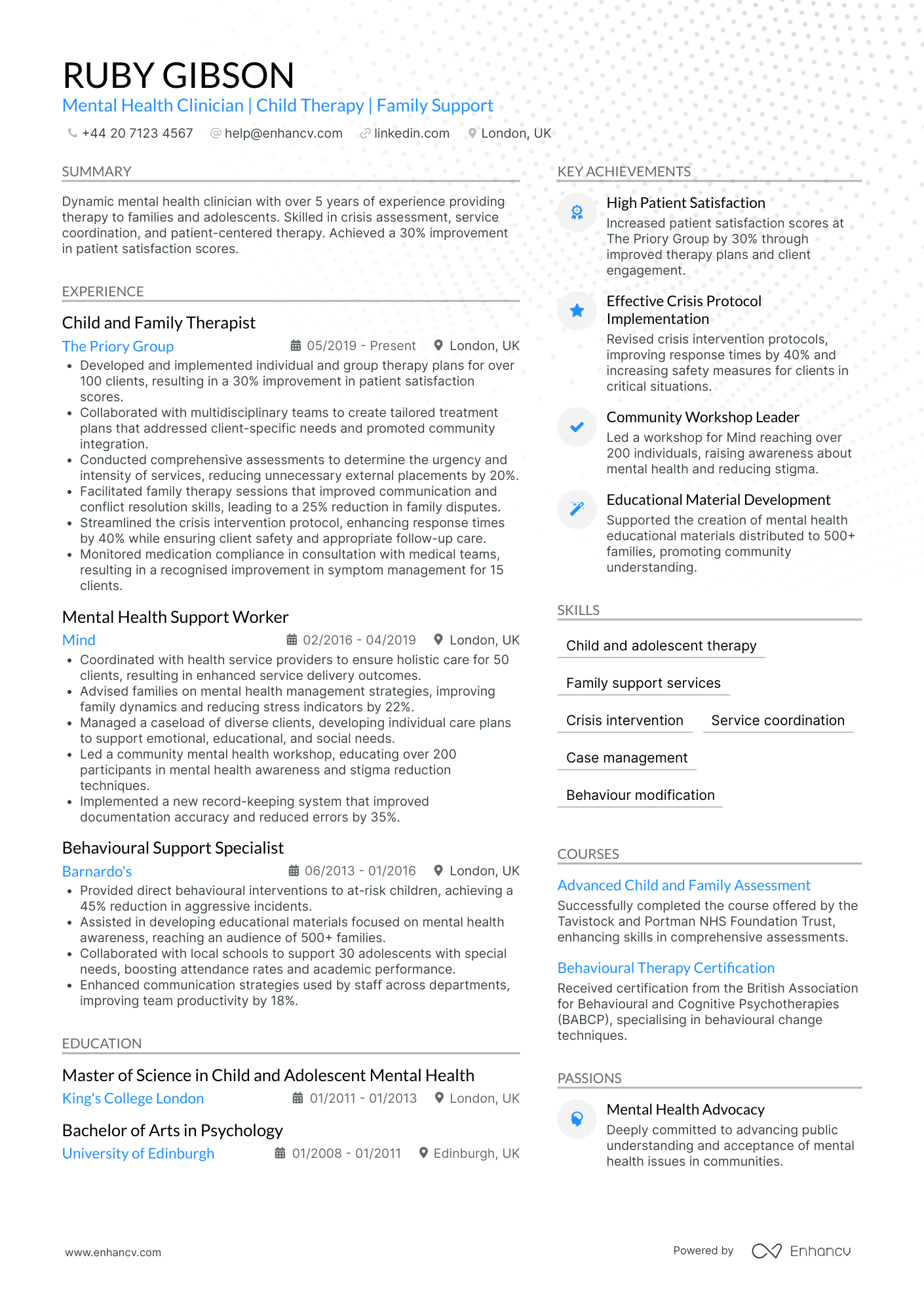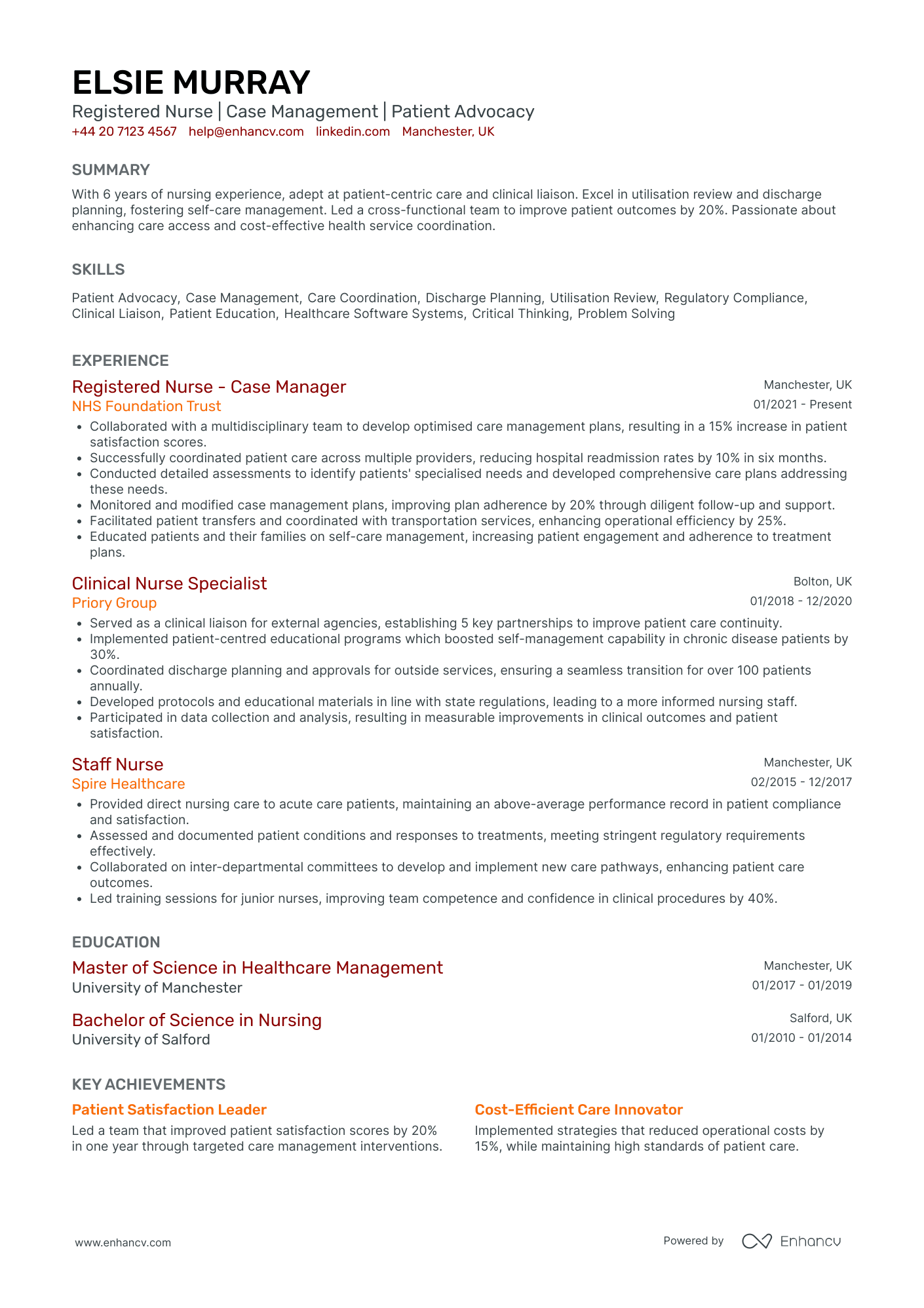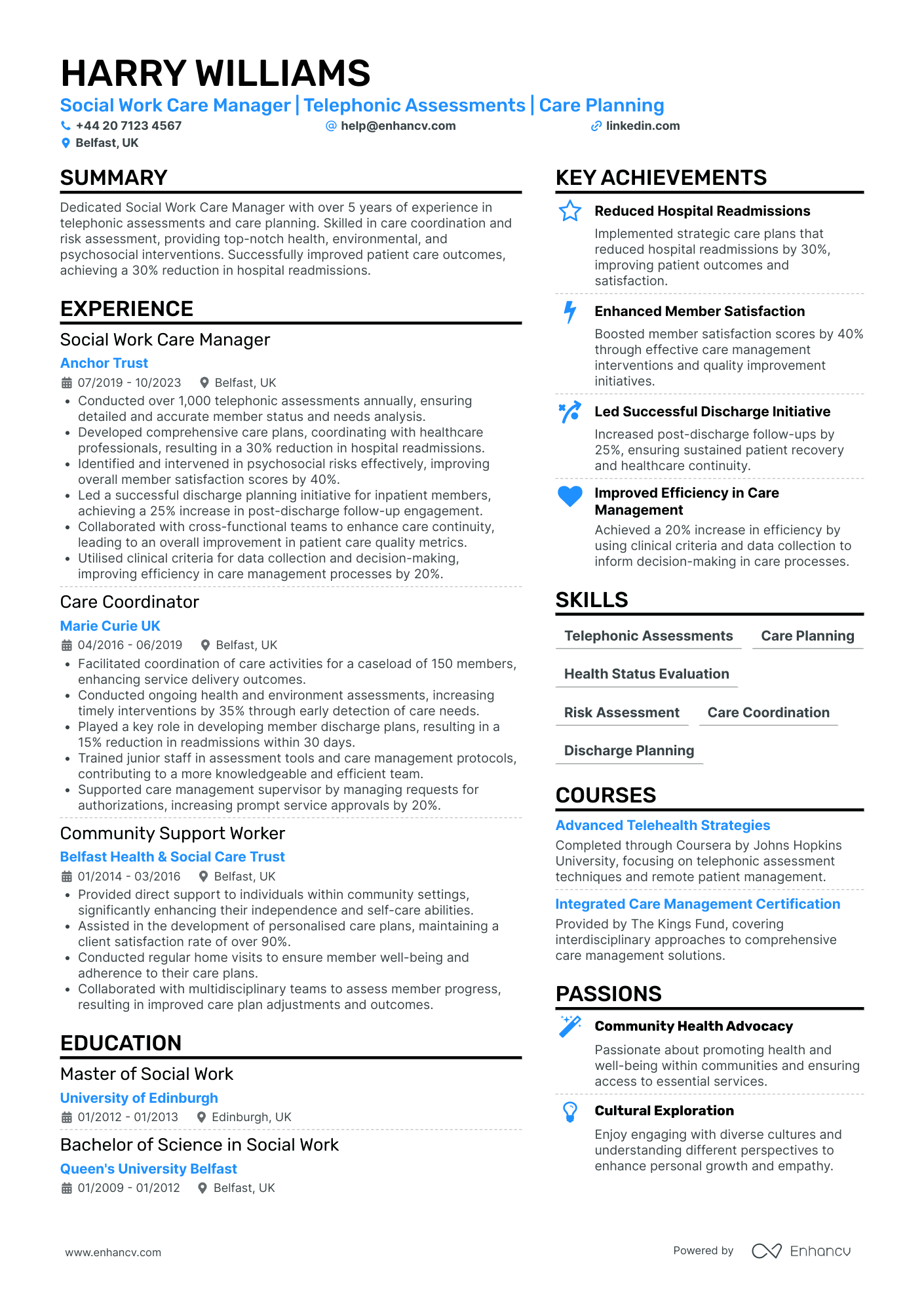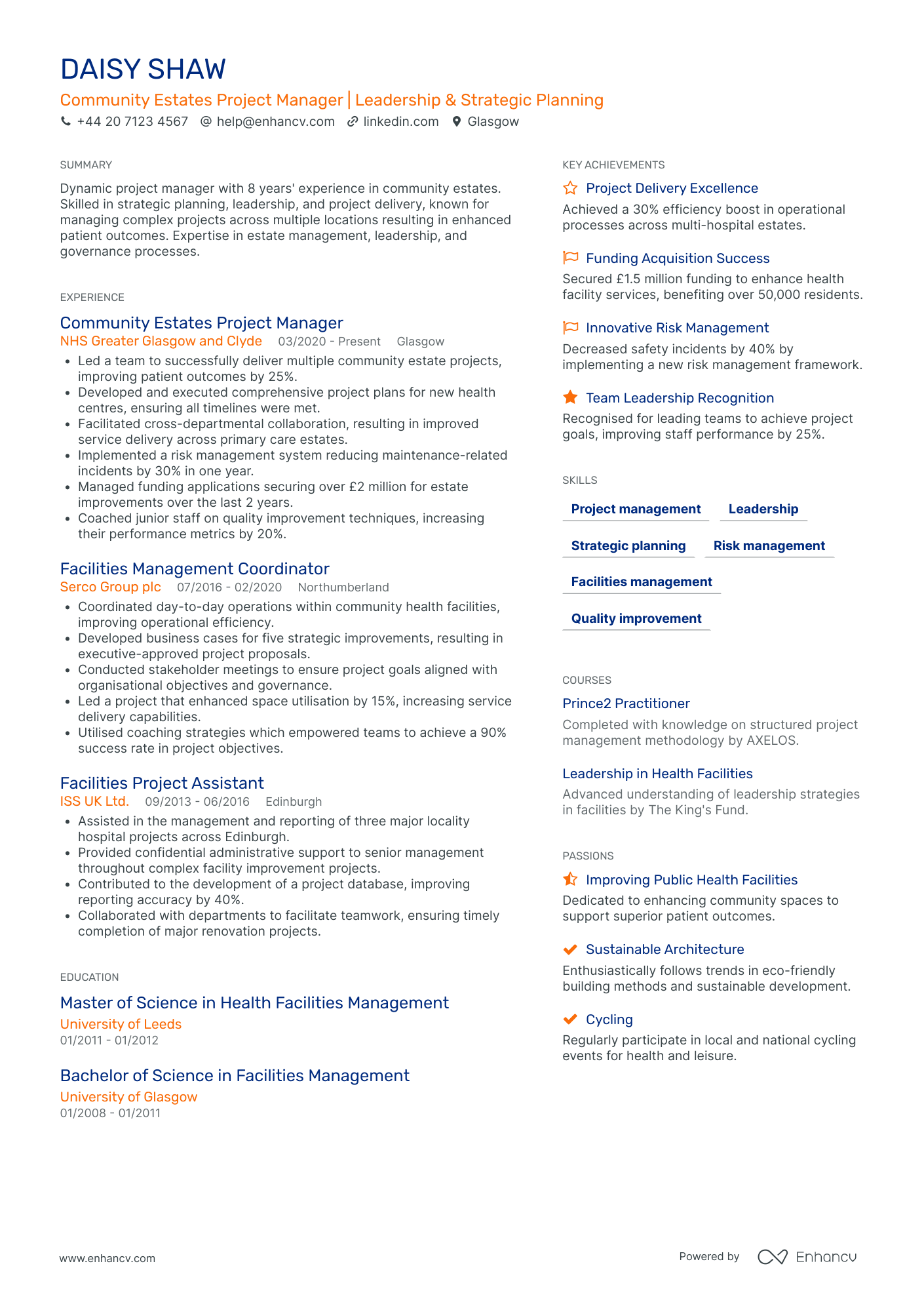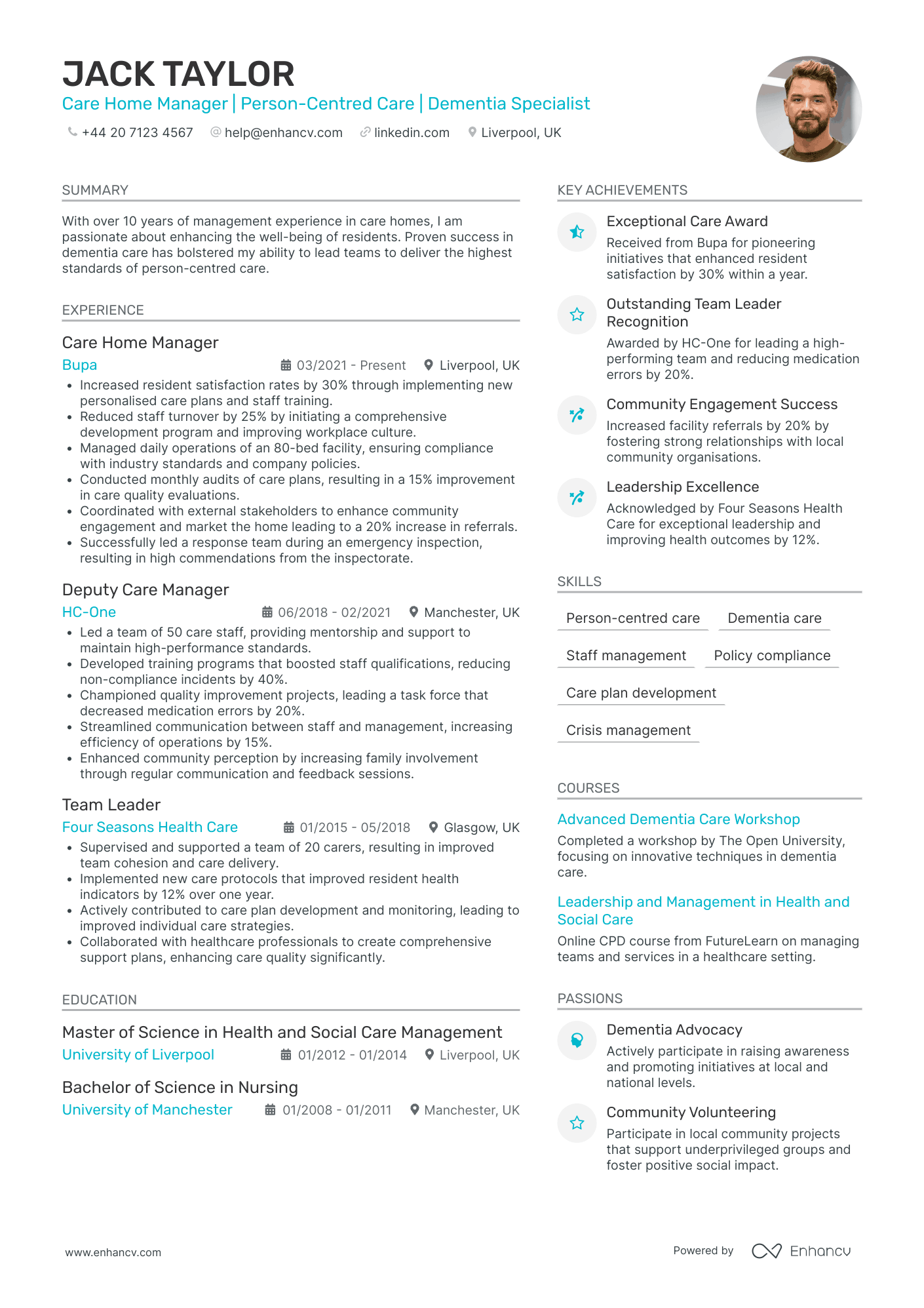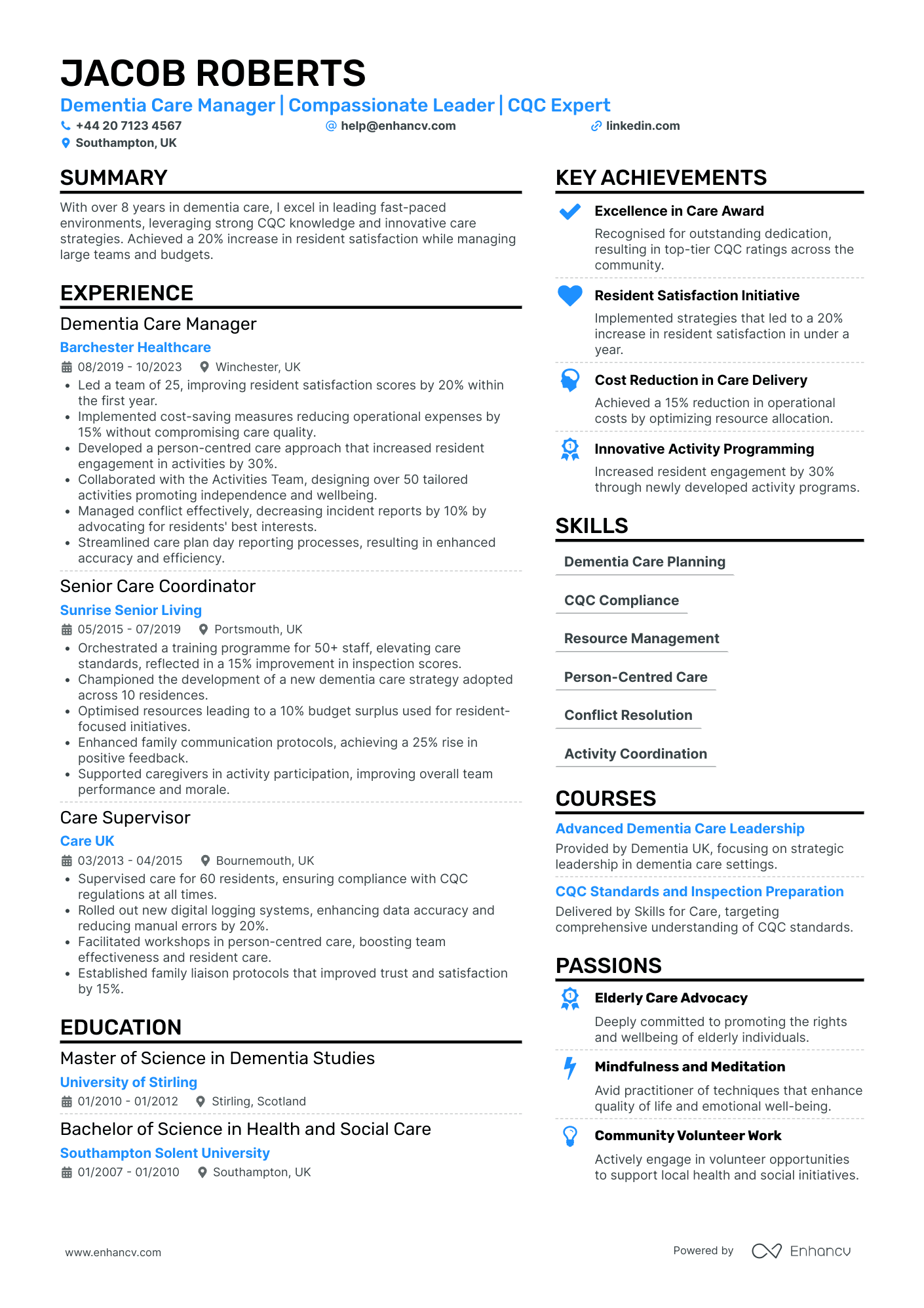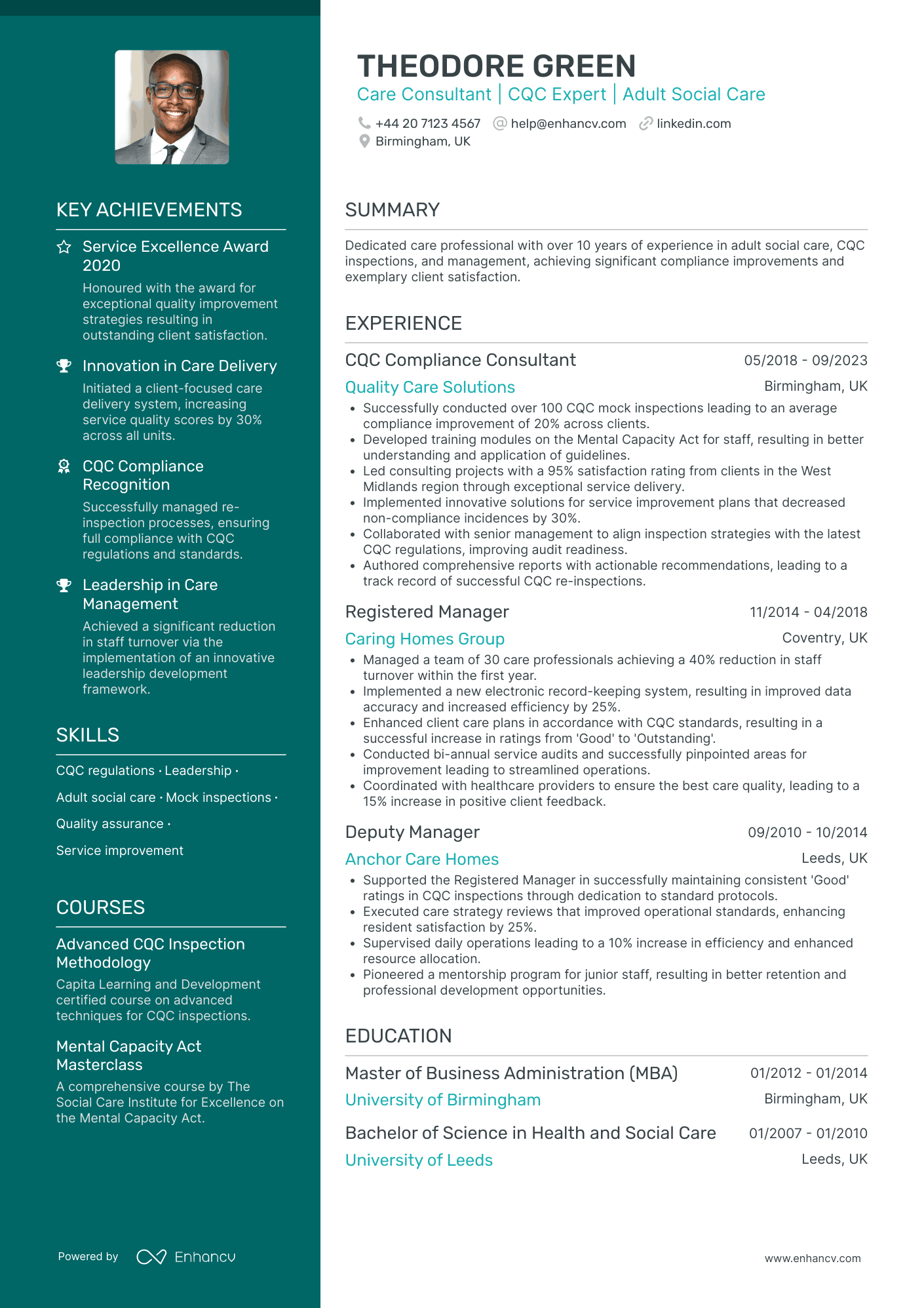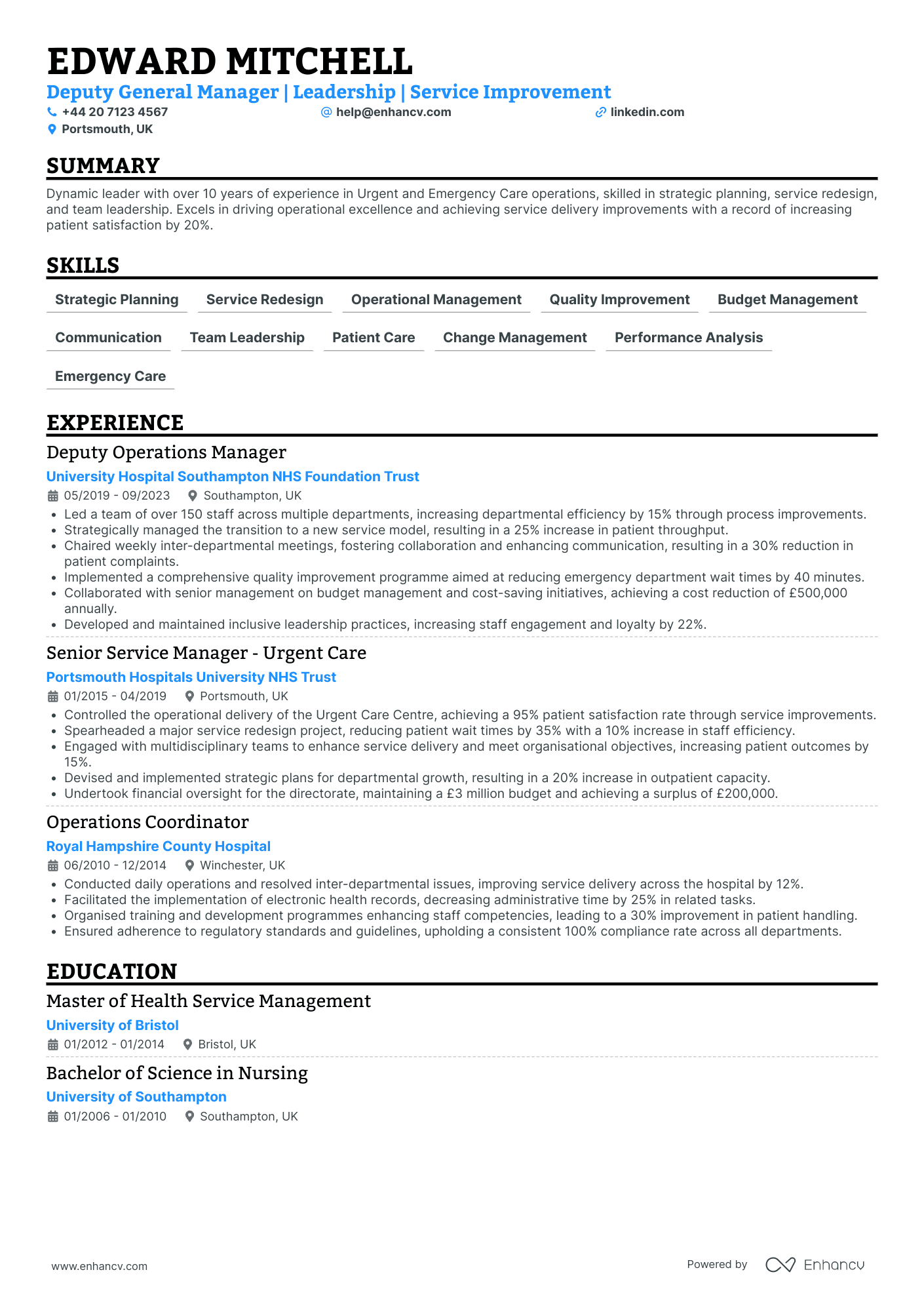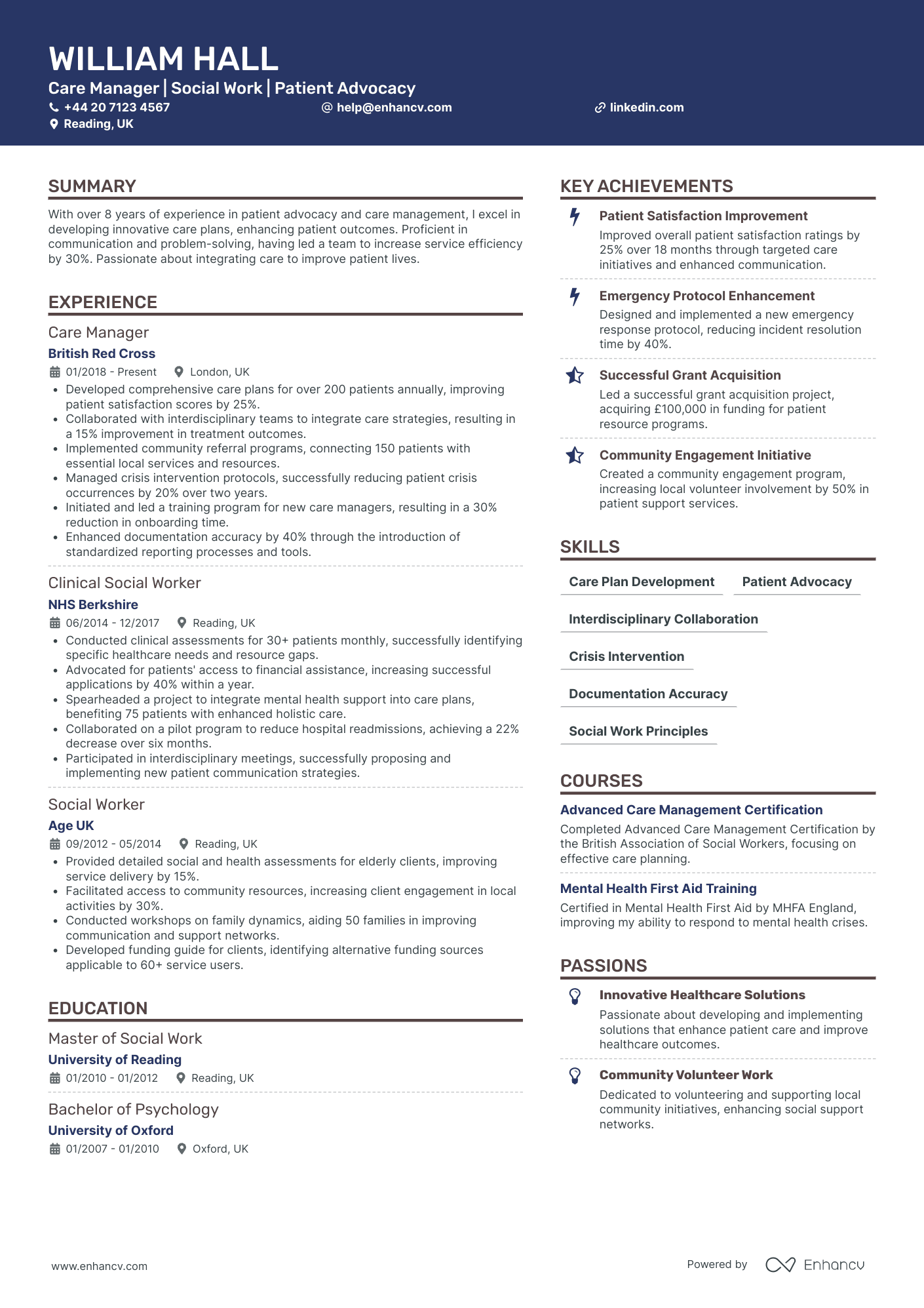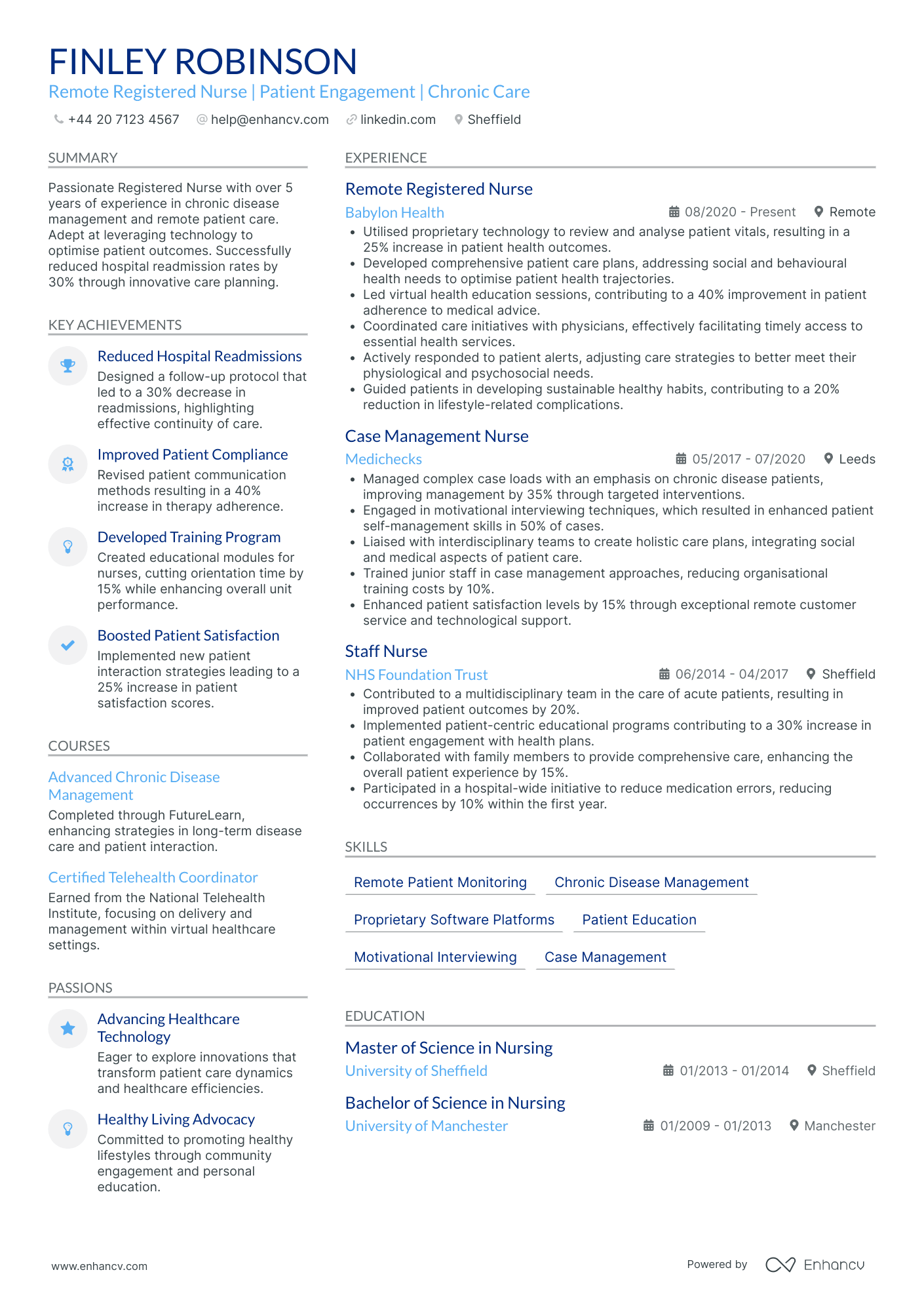One specific CV challenge you might face as a care manager is effectively showcasing your multidisciplinary skills to prospective employers. Our guide offers tailored advice on structuring your CV to highlight your comprehensive expertise, ensuring it stands out in a competitive job market.
- Applying the simplest CV design, so that recruiters can easily understand your expertise, skills, and professional background;
- Ensuring you stand out with your header, summary or objective statement, and a designated skills section;
- Creating your CV experience section - no matter how much expertise you have;
- Using real life professional CV examples to enhance the structure and outline of your profile.
If you still have no muse to write your professional CV, find some more industry-leading examples.
CV examples for care manager
By Experience
Senior Care Manager
- Effective Content Presentation - The CV is exceptionally well-structured and concise, presenting each section clearly with comprehensive details that are easy to understand. This ensures that the reader can quickly grasp Sophia's robust experience in healthcare management and track her career growth effectively.
- Demonstrated Career Growth Through Increased Responsibilities - Sophia's career trajectory exemplifies progression, showing a consistent rise in responsibilities across her roles from a Healthcare Analyst to a Senior Care Manager. This advancement highlights her capacity to take on leadership roles and manage larger teams and projects over time.
- Significant Achievements with Business Impact - Noteworthy accomplishments within the CV, such as a 25% improvement in member satisfaction and a 15% reduction in hospital readmissions, underscore Sophia's ability to deliver impactful results that align with strategic business objectives like improving healthcare outcomes and organizational efficiency.
Assistant Care Manager
- Comprehensive career growth reflected - Max’s career trajectory is clearly presented, showing a progressive pathway from Care Assistant to Assistant Care Manager over nearly a decade. Each position builds upon his growing responsibilities in dementia care and leadership, providing a consistent industry-focused career path.
- Impact of leadership on operational improvements - The CV highlights Max’s leadership and management skills with concrete results, such as a 30% increase in service efficiency. These statistics are complemented by narrative that considers how effective leadership and mentorship have driven operational success and enhanced the team's capabilities.
- Depth in dementia care expertise - Industry-specific competencies such as implementing new dementia care training modules and crafting personalized care plans demonstrate not only Max's commitment to the field but also his ability to innovate and apply specialized skills for improved patient outcomes and safety.
Deputy Care Manager
- Clarity and Structure in Content Presentation - The CV is well-structured, with clearly defined sections such as Summary, Experience, Education, and Skills. Each section is concise and focused, allowing quick access to essential information. The use of bullet points in the experience section is particularly effective for highlighting key achievements without overwhelming detail.
- Significant Career Growth and Leadership - Charlotte Powell's career trajectory demonstrates a clear path of growth in the care management field, moving from a Care Supervisor to an Assistant Manager, and currently a Deputy Care Manager. Each role builds upon the last, showcasing a consistent climb in responsibilities and leadership capabilities, all within related sectors, indicating a strong commitment to the industry.
- Industry-Specific Achievements with Impact - The CV highlights key achievements with tangible impacts, such as a 30% improvement in compliance audit scores and reducing staff turnover by 15%. These accomplishments not only reflect her adeptness at problem-solving but also emphasize her ability to bring about significant operational improvements, directly benefiting both staff and residents.
By Role
Residential Care Manager
- Logical and Efficient Content Presentation - The CV is structured in a clear and concise manner, with distinct sections dedicated to each career aspect, from education to experience and skills. Bullet points are effectively used to highlight key achievements, ensuring ease of readability and quick access to relevant information, which is crucial for hiring managers scanning numerous applications.
- Progressive Career Development and Responsibility Scaling - Charlie Thomas demonstrates a consistent growth trajectory, evolving from a Shelter Programme Coordinator to a Residential Care Manager. This progression illustrates not only an increase in responsibility but also a broadening of skills, reflecting a commitment to advancing within the social work and residential care sectors.
- Emphasis on Crisis Management and Advocacy - The CV places a strong emphasis on industry-specific skills such as crisis management and client advocacy, showcasing advanced methodologies employed in crisis de-escalation and strategic interventions. These elements are tailored to highlight Charlie's proficiency in managing high-stakes environments and contribute uniquely to their field of work.
Primary Care Manager
- Structured and Focused Presentation - The CV is structured in a clear, concise manner. Each section is well-defined, enhancing readability and making it easy to locate specific information. The use of bullet points aids in skimming and highlights key achievements and responsibilities, ensuring the candidate's experience and competencies are easy to digest quickly.
- Impressive Career Progression in Healthcare - Ella’s career trajectory demonstrates a clear advancement in the healthcare service management field. Starting as a Health Project Manager, moving to a Clinical Operations Manager, and now holding a senior management position at NHS England, illustrates a pattern of professional growth and increased responsibility, showcasing her capability to thrive and excel in the industry.
- Impact-Driven Achievements - The CV emphasizes significant achievements with considerable business relevance beyond mere statistics. For example, improving patient access by reducing waiting times and enhancing service delivery efficiency demonstrates a direct impact on patient care and organizational success, reinforcing her role's importance in healthcare service improvement.
Care Quality Manager
- Structured and Clear Presentation - The CV is well-organized, presenting each section distinctly, making it easy to navigate. The use of bullets under each role, aligned with dates and locations, allows the reader to quickly comprehend the timeline and context of Harper Webb’s career. This clarity showcases essential information concisely.
- Career Growth and Specialization - Harper Webb’s career trajectory is impressive, showing logical progression from a Clinical Nurse to a Quality Care Manager. This advancement demonstrates a strong commitment to the field of hospice care and highlights her ability to take on increased responsibilities and leadership roles over time.
- Industry-Specific Expertise - The CV includes specialized knowledge of tools and methodologies specific to hospice management, such as expertise in Home Care Home Base (HCHB) and Quality Assurance and Performance Improvement (QAPI) systems. These technical competencies underline her ability to improve care delivery and documentation processes within the hospice context.
Urgent Care Manager
- Structured Career Progression - Freddie Hughes' CV showcases a logical career advancement within the healthcare sector, beginning with a foundational role at Brighton and Sussex University Hospitals and progressing to a leadership position at NHS England. Each role indicates increased responsibility, highlighting a trajectory of professional growth and sector-specific expertise.
- Integration of Cross-Functional Experiences - The CV effectively demonstrates Freddie's ability to work across different teams and departments, highlighted by their role in system-wide planning and collaborations with external partners. This adaptability showcases their capability to drive improvements across various functions and levels of the organization.
- Impactful Achievements with Measurable Outcomes - Each experience section within the CV substantiates Freddie's impact with data-driven achievements. For instance, leading initiatives for a 20% reduction in waiting times and improving patient satisfaction by 12% are not just numbers but resonate with direct patient care enhancement and operational efficacy.
Critical Care Manager
- Structured Presentation - The CV is well-organized with clearly defined sections for education, experience, skills, and achievements, making it easy for potential employers to quickly navigate and assess the candidate's qualifications and expertise relevant to a Health Care Assistant role.
- Career Growth and Development - The candidate demonstrates a clear career trajectory, starting as a Care Assistant and progressing to a Senior Care Worker and then a Health Care Assistant. This upward movement reflects their growing expertise and leadership within the healthcare industry over a decade, with particular specialization in critical care.
- Focus on Measurable Impact - The candidate emphasizes quantifiable achievements, such as improving patient satisfaction by 25% and reducing health and safety incidents by 10%, underlining their ability to drive meaningful improvements in patient care and hospital operations.
Health Care Manager
- Structured Career Progression - Harry's career demonstrates a clear growth trajectory within the mental health and care management sector, starting as a Case Manager and advancing to a Care Manager. This progression reflects increased responsibilities and leadership capabilities, affirming his commitment and adaptability within the industry.
- Emphasis on Impactful Achievements - The CV effectively highlights Harry's ability to drive significant outcomes through his work. For example, his development of over 150 personalized care plans led to a 30% improvement in client satisfaction, underscoring the tangible benefits of his proficiency in service coordination and client advocacy.
- Diverse Skill Set with Cross-functional Expertise - A robust set of skills is presented, including comprehensive assessments, record maintenance, and health IT utilization, which signifies his capacity to leverage technology for improved care management. His knowledge and experience not only enhance service delivery but also ensure the integration of modern methodologies within health settings.
Child Care Manager
- Effective use of section headers and bullet points - The CV is structured with clear section headers and concise bullet points, making it easy for hiring managers to navigate quickly. This clarity ensures that the key competencies, work experience, and educational background are accessible and straightforward, helping the reader form a complete understanding of the candidate’s qualifications at a glance.
- Proven leadership in diverse settings - The career trajectory highlights the candidate's growth through progressive leadership roles across multiple industries. This progression demonstrates an ability to apply core management skills in various environments, suggesting a strong potential for strategic oversight in new areas and the adaptability required to lead cross-functional teams effectively.
- Emphasis on innovative problem-solving with technical methodologies - The CV features unique industry-specific elements underlining the candidate's expertise in using advanced analytics and data-driven methodologies to solve complex challenges. By detailing experiences with sophisticated tools such as Tableau and SAP, the CV showcases not only technical depth but also a strong approach to enhancing operational efficiencies and informed decision-making.
Mental Health Care Manager
- Structured and Cohesive Layout - The CV is well-organized, with sections clearly delineated, making it easy to follow. Each section contributes meaningfully to the overall narrative, keeping the flow logical and concise, which ensures that the reader can quickly grasp the key elements of Ruby Gibson's qualifications and experience.
- Progression in Mental Health Field - Ruby’s career trajectory reflects a steady progression within the mental health industry, advancing from a Behavioral Support Specialist to a Child and Family Therapist. This growth highlights an increasing level of responsibility and expertise, indicating a commitment to professional development within her chosen field.
- Impactful Achievements with Tangible Outcomes - The CV emphasizes achievements that go beyond mere numbers to underscore meaningful patient and organizational impact. For example, the ability to streamline crisis intervention protocols resulted in improved safety and responsiveness, demonstrating not only competency but also direct enhancements in service delivery and patient care.
Palliative Care Manager
- Well-structured Presentation - The CV is organized with clear sections that allow for easy navigation through the candidate’s experience, education, and skills. Each section uses concise bullet points to deliver key information efficiently, highlighting relevant achievements and responsibilities without overwhelming the reader. This structured approach communicates professionalism and attention to detail.
- Demonstrated Professional Growth - Elsie Murray’s career trajectory showcases a clear path of progression from a Staff Nurse to a specialized managerial role in case management, reflecting her growing expertise and increasing responsibilities. Her shift from general nursing duties to a focus on case management and patient advocacy underlines her commitment to evolving within her field and taking on more significant roles in healthcare.
- Impactful Achievements - The candidate’s accomplishments are not just metrics but represent significant improvements in healthcare delivery and patient outcomes. Achievements such as reducing hospital readmission rates and increasing patient satisfaction by implementing targeted interventions illustrate her ability to drive meaningful change within healthcare settings, demonstrating both business relevance and patient-centered improvements.
Social Care Manager
- Concise and Structured Content Presentation - The CV is well-organized and easy to navigate, with clear headings and sections that effectively communicate the candidate's qualifications. The use of bullet points in the experience section allows for concise and direct presentations of responsibilities and achievements, making it easy for recruiters to identify key information quickly.
- Impressive Career Growth and Development - Over the course of their career, the candidate has demonstrated consistent growth and development through increasingly responsible roles. Starting as a Community Support Worker and advancing to a Social Work Care Manager, the progression showcases a trajectory of acquiring advanced skills and responsibilities within the social work field.
- Insightful Use of Industry-Specific Tools and Methodologies - The CV highlights specialized knowledge in social work and care management, with mentions of specific methodologies like telephonic assessments and utilization review. The candidate's familiarity with industry-standard tools such as FHIR and SNOMED indicates a deep understanding of the technical aspects relevant to their role.
Community Care Manager
- Strategic Clarity in Content Presentation - The CV efficiently communicates Daisy Shaw's skills and experience with a well-structured format, allowing readers to quickly grasp her qualifications and career history. Key achievements and responsibilities are presented concisely, ensuring that only the most relevant information is highlighted to maintain the reader's attention.
- Progressive Career Trajectory - Daisy's career journey showcases her steady advancement and increasing responsibilities within the industry. Her transition from a Facilities Project Assistant to a Community Estates Project Manager indicates a clear path of professional growth with increasing leadership roles, demonstrating her capability to handle more complex and impactful projects over time.
- Distinctive Tools and Methodologies - The CV emphasizes Daisy's expertise in implementing risk management systems and facilitating cross-departmental collaboration within the community estates sector. These industry-specific skills highlight her ability to manage and improve facilities through strategic and methodical approaches, which align directly with her role as a project manager.
Home Care Manager
- Structured and Coherent Presentation - The CV is effectively organized, beginning with a concise summary that immediately frames Jack Taylor as an expert in care home management. Each section is clearly defined, with bullet points under experience that succinctly articulate responsibilities and achievements, ensuring clarity and ease of reading.
- Demonstrates Steady Career Progression - Jack Taylor's career trajectory showcases a clear path of professional growth, transitioning from a Team Leader to a Care Home Manager. This progression indicates a continuous development of skills and responsibilities, reflecting his advancement within the industry without abrupt career shifts, underscoring his commitment to care management.
- Impactful Achievements with Real-World Relevance - The CV prominently features significant achievements like a 30% increase in resident satisfaction and a 20% reduction in medication errors. These accomplishments are not just numbers; they represent meaningful contributions to the quality of care and operational efficiency, illustrating Jack's capacity to drive substantial improvements within his roles.
Dementia Care Manager
- Structured and Concise Presentation - The CV is organized with clear sections that enhance readability, allowing the hiring manager to quickly understand the candidate's qualifications. The succinct format efficiently communicates key responsibilities and achievements, maintaining focus on areas relevant to a Dementia Care Manager role.
- Progressive Career Growth in Dementia Care - Jacob Roberts' career trajectory reflects steady advancement in the field of dementia care, showcasing promotions from Care Supervisor to Dementia Care Manager. This growth illustrates his capability to take on increasing responsibilities and leadership roles within the same industry.
- Specialized Knowledge in Dementia Care and CQC Standards - The inclusion of industry-specific elements, such as proficiency in CQC compliance and dementia care strategies, demonstrates Jacob's mastery of essential tools and methodologies. His commitment to quality care is further supported by specialized courses, reinforcing his expertise and ability to meet regulatory standards.
Adult Care Manager
- Focused on structured growth and targeted expertise - Theodore Green's career trajectory showcases a clear path of upward movement from Deputy Manager to a Care Consultant role, emphasizing development in expertise, particularly in CQC regulations, which is constantly relevant to his industry.
- Mastery of industry-specific methodologies - The CV highlights Theodore's deep knowledge and practical application of complex industry standards like the CQC guidelines, the Mental Capacity Act, and mock inspections, conveying his technical depth and specialization in quality assurance within adult social care.
- Leadership underscored by impactful results - His achievements, including reducing staff turnover and improving service ratings, demonstrate his effective leadership, team-building abilities, and strategic thinking which have significant business relevance in enhancing both operational efficiency and client satisfaction.
Emergency Care Manager
- Clear progression and strategic leadership - The CV effectively showcases Edward Mitchell's career growth from an Operations Coordinator to a Deputy General Manager, indicating a strong trajectory in healthcare management. This progression highlights his capability to advance and his commitment to leadership roles, reflecting his suitability for senior management positions.
- Emphasis on service improvement initiatives - Throughout his roles, Edward has consistently led service redesign and quality improvement projects, demonstrating his expertise in operational excellence. These initiatives, such as reducing emergency department wait times and patient complaints, indicate significant contributions to enhancing healthcare delivery.
- Diverse cross-functional skills - The CV lists a range of skills from strategic planning and quality improvement to change management and financial oversight. This diversity signifies his ability to lead multi-departmental teams and his potential to deliver comprehensive improvements across healthcare operations.
Outpatient Care Manager
- Clear and Structured Presentation - William Hall's CV is presented with clarity and logical structure, enhancing readability. With distinct sections for experience, education, skills, achievements, and passions, it allows for easy navigation and quick absorption of information pertinent to the roles he's held.
- Progressive Career Growth - The career trajectory of William Hall demonstrates significant growth, from starting as a Social Worker at Age UK to advancing to a Care Manager at the British Red Cross. His career path shows not only vertical growth but also a deepening engagement with patient advocacy and care management, reflecting a natural progression and dedication to his field.
- Impactful Achievements - The CV includes achievements that highlight the tangible impact William has had in his roles. Notable numbers illustrate his contributions, such as improving patient satisfaction by 25% and achieving a successful grant acquisition of £100,000. These figures underscore his ability to drive positive changes and resources essential to his sector.
Clinical Care Manager
- Structured and Focused Content Presentation - The CV is well-organized, providing a clear outline of the candidate's trajectory from education through to their latest roles, each section building upon the last. This helps the reader easily navigate through Finley Robinson's qualifications and relevant experiences that enhance their candidacy for roles focusing on patient care and engagement.
- Career Trajectory Reflecting Growth in Remote Healthcare - Finley's career path demonstrates a clear progression from being a Staff Nurse to advancing roles in remote patient management. Each step is paired with increasing responsibilities and impact, such as reducing hospital readmissions and enhancing patient satisfaction, illustrating a commitment to adapting to healthcare industry shifts, particularly in virtual care solutions.
- Effective Use of Technology in Patient Management - Unique to this CV is the depth of technical application, showcasing Finley's proficiency in proprietary healthcare software platforms to enhance patient outcomes significantly. Their experience with telehealth and remote monitoring highlights an advanced capability to integrate technology into chronic disease management, which is crucial for modern healthcare environments.
How to ensure your profile stands out with your care manager CV format
It's sort of a Catch 22. You want your care manager CV to stand out amongst a pile of candidate profiles, yet you don't want it to be too over the top that it's unreadable. Where is the perfect balance between your CV format simple, while using it to shift the focus to what matters most. That is - your expertise. When creating your care manager CV:
- list your experience in the reverse chronological order - starting with your latest roles;
- include a header with your professional contact information and - optionally - your photograph;
- organise vital and relevant CV sections - e.g. your experience, skills, summary/ objective, education - closer to the top;
- use no more than two pages to illustrate your professional expertise;
- format your information using plenty of white space and standard (2.54 cm) margins, with colours to accent key information.
Once you've completed your information, export your care manager CV in PDF, as this format is more likely to stay intact when read by the Applicant Tracker System or the ATS. A few words of advice about the ATS - or the software used to assess your profile:
- Generic fonts, e.g. Arial and Times New Roman, are ATS-compliant, yet many candidates stick with these safe choices. Ensure your CV stands out by using a more modern, and simple, fonts like Lato, Exo 2, Volkhov;
- All serif and sans-serif fonts are ATS-friendly. Avoid the likes of fancy decorative or script typography, as this may render your information to be illegible;
- Both single- and double-column formatted CVs could be assessed by the ATS;
- Integrating simple infographics, icons, and charts across your CV won't hurt your chances during the ATS assessment.

PRO TIP
Use font size and style strategically to create a visual hierarchy, drawing the reader's eye to the most important information first (like your name and most recent job title).

The top sections on a care manager CV
- Professional Summary demonstrates your care management expertise.
- Key Skills section highlights your relevant care management abilities.
- Work Experience showcases your practical care manager roles.
- Education & Qualifications reflect your foundation in health or social care.
- Professional Development displays ongoing learning in the care management field.

What recruiters value on your CV:
- Detail your experience in managing care services, highlighting specific instances where you improved care quality or efficiency, as care managers are expected to lead their teams towards excellence in service delivery.
- Emphasise your knowledge of regulatory standards and compliance, as care managers must navigate complex healthcare regulations and ensure their services meet all legal requirements.
- Demonstrate your emotional intelligence and strong communication skills by mentioning your ability to handle difficult conversations with service users, families, and staff, which is crucial in the care management role.
- Showcase your ability to manage budgets and resources effectively by citing examples where you have successfully optimised costs without compromising the quality of care.
- Include any relevant professional training or certifications in care management or leadership, as these qualifications can set you apart from other candidates and reinforce your expertise in the field.
Recommended reads:
What information should you include in your care manager CV header?
The CV header is potentially the section that recruiters would refer to the most, as it should include your:
- Contact details - your professional (non-work) email address and phone number;
- Professional photograph - if you're applying hinting at the value you bring as a professional.
Many professionals often struggle with writing their care manager CV headline. That's why in the next section of this guide, we've curated examples of how you can optimise this space to pass any form of assessment.

Examples of good CV headlines for care manager:
- Lead Care Manager | Person-Centred Planning Specialist | NVQ Level 5 | 10+ Years' Experience
- Senior Healthcare Coordinator | Multidisciplinary Team Leadership | BSc Nursing | 15+ Years in Care Management
- Assistant Care Manager | Elderly & Disability Care Focus | QCF Level 3 | 5 Years' Progression
- Care Service Manager | Strategic Policy Implementation | Mental Health Expertise | CQC Standards | 12 Years
- Deputy Care Manager | Staff Training & Development Lead | Safeguarding Champion | NVQ Level 4 | 8 Years
- Clinical Care Manager | Patient Advocacy Professional | Registered Nurse | Quality Assurance | 20+ Years Experience
Choosing your opening statement: a care manager CV summary or objective
At the top one third of your CV, you have the chance to make a more personable impression on recruiters by selecting between:
- Summary - or those three to five sentences that you use to show your greatest achievements. Use the CV summary if you happen to have plenty of relevant experience and wish to highlight your greatest successes;
- Objective - provides you with up to five sentences to state your professional aims and mission in the company you're applying for

CV summaries for a care manager job:
More detailed look into your work history: best advice on writing your care manager CV experience section
The CV experience is a space not just to merely list your past roles and responsibilities. It is the CV real estate within which you could detail your greatest accomplishments and skills, while matching the job requirements. Here's what to have in your experience section:
- Prove you have what the job wants with your unique skill set and past successes;
- Start each bullet with a strong, action verb, and continue with the outcome of your responsibility;
- Use any awards, nominations, and recognitions you've received as solid proof of your skill set and expertise;
- align your experience with the role responsibilities and duties.
For more help on how to write your CV experience section, check out the next section of our guide:

Best practices for your CV's work experience section
- Implemented individual care plans for clients, ensuring personalised support whilst coordinating with healthcare professionals to meet each individual's needs effectively.
- Conducted comprehensive assessments of clients' physical and mental health status, facilitating appropriate interventions and support services.
- Oversaw a team of care workers, providing training and ongoing supervision to ensure high-quality care and adherence to regulatory standards.
- Managed crisis situations by quickly evaluating risks, coordinating with emergency services when necessary, and providing post-incident support and evaluation.
- Liaised with families and external agencies to advocate for clients' needs, securing necessary resources and promoting the clients' best interests.
- Managed budgetary aspects of care provision, such as funding allocations and cost control, ensuring efficient use of resources without compromising quality of care.
- Developed and maintained accurate records and care plans using electronic health record systems, ensuring compliance with data protection legislation and confidentiality protocols.
- Implemented continuous improvement protocols for care practices, including the introduction of innovative care techniques and technologies that enhanced client well-being.
- Facilitated multidisciplinary team meetings to discuss and review client progress, fostering an integrated approach to care that leveraged diverse expertise.
- Directed a team of 12 care coordinators to optimize patient care delivery, achieving a 15% improvement in patient satisfaction scores.
- Implemented a new electronic health records system that reduced manual data entry by 30% and improved data accuracy.
- Developed and executed a targeted care plan for high-risk patients, reducing hospital readmission rates by 20% within the first year.
- Spearheaded the restructuring of care management processes, reducing operational costs by 18% while maintaining high care standards.
- Successfully negotiated with insurance providers to expand coverage for our patients, leading to a 25% increase in billable services.
- Orchestrated a community outreach program that improved patient engagement and care plan adherence by 35%.
- Collaborated with interdisciplinary teams to develop personalized care pathways, enhancing the coordination of services for 500+ patients.
- Managed a budget of $2.5M while successfully identifying areas for cost savings, which provided additional funds for patient services.
- Introduced a patient feedback system that led to a comprehensive service improvement strategy, reflected in a 40% decrease in complaints.
- Led the transition to a patient-centered care model, which improved patient experience metrics by 22% over a two-year period.
- Conducted monthly training sessions for 50+ staff members on best practices in personalized care, greatly enhancing team competencies.
- Fostered partnerships with local health organizations, resulting in a collaborative care network that benefitted over 800 patients annually.
- Launched a telehealth program that increased access to care for rural populations by 60%, while also improving follow-up compliance.
- Overhauled patient intake procedures, reducing average wait times from 45 minutes to 15 minutes and enhancing patient throughput.
- Managed cross-functional project teams to deliver community health initiatives that increased brand visibility in the healthcare marketplace.
- Developed a comprehensive care training program, raising the skill level of 35 care coordinators and improving the delivery of patient-centric solutions.
- Conducted detailed data analysis to identify trends and create initiatives that reduced overall service costs by 12% annually.
- Led a quality assurance program that improved compliance with care standards by 95%, resulting in a higher quality of patient care.
- Championed the use of care management software to track patient progress, leading to a 10% increase in efficiency in care coordination.
- Cultivated strong relationships with healthcare providers to ensure a seamless continuum of care for patients across various settings.
- Initiated a caregiver support network that reduced caregiver burnout rates by 28% within the first six months of implementation.
- Led a cross-departmental initiative to streamline care management services, achieving a 17% increase in patient throughput.
- Implemented performance metrics for care staff that correlated with a 20% improvement in patient care efficiency within the first year.
- Pioneered a health literacy program that empowered 1,200+ patients with knowledge to manage their conditions effectively.
- Piloted an innovative chronic disease management program that improved patient self-management skills for over 200 clients.
- Engaged in risk stratification for a patient pool of over 1,000, enabling tailored interventions that reduced emergency department visits by 15%.
- Mentored and coached a team of 20 junior care managers to develop their professional skills and achieve departmental goals.
- Spearheaded the design and implementation of a best-in-class care management process that was subsequently adopted across the organization.
- Played a pivotal role in developing a proprietary predictive analytics tool that improved patient outcome tracking and risk assessment accuracy by 25%.
- Orchestrated a successful accreditation process for the care management department, ensuring compliance with national healthcare standards.
Swapping your professional experience (when you have none) with skills and more
Never underestimate the importance of relevancе when it comes to your care manager CV. Even if you don't happen to have much or any standard (full-time contract) professional experience, this doesn't mean you shouldn't apply for the role. Instead of a bespoke CV experience section:
- Showcase more prominently any internships, part-time roles, and volunteer experience that are applicable to the role and have taught you job-crucial skills;
- Feature a strengths or achievements section with your transferrable skills or talents you've obtained thanks to your work or life experience;
- Write an objective statement that clearly outlines your values as a candidate and defines your career ambitions;
- List your education or certificates that match the job profile closer to the top of your CV.
Recommended reads:

PRO TIP
If you have experience in diverse fields, highlight how this has broadened your perspective and skill set, making you a more versatile candidate.
Key care manager CV skills: what are hard skills and soft skills
Let's kick off with the basics. You know that you have to include key job requirements or skills across your CV. For starters, take individual skills from the job description and copy-paste them into your CV, when relevant. Doing so, you'll ensure you have the correct skill spelling and also pass the Applicant Tracker System (ATS) assessment. There are two types of skills you'll need to include on your CV:
- Hard skills - technical abilities that are best defined by your certificates, education, and experience. You could also use the dedicated skills section to list between ten and twelve technologies you're apt at using that match the job requirements.
- Soft skills - your personal traits and interpersonal communication skills that are a bit harder to quantify. Use various CV sections, e.g. summary, strengths, experience, to shine a spotlight on your workspace achievements, thanks to using particular soft skills.
Remember that your job-winning CV should balance both your hard and soft skills to prove your technical background, while spotlighting your personality.
Top skills for your care manager CV:
Case Management
Patient Care Coordination
Care Planning
Medical Knowledge
Clinical Skills
Regulatory Compliance
Healthcare Management
Budgeting
Electronic Health Record (EHR) Proficiency
Data Analysis
Communication
Empathy
Problem-Solving
Leadership
Teamwork
Time Management
Decision-Making
Adaptability
Conflict Resolution
Resilience

PRO TIP
If there's a noticeable gap in your skillset for the role you're applying for, mention any steps you're taking to acquire these skills, such as online courses or self-study.
Listing your university education and certificates on your care manager CV
The best proof of your technical capabilities would be your education and certifications sections. Your education should list all of your relevant university degrees, followed up by their start and completion dates. Make sure to also include the name of the university/-ies you graduated from. If you happen to have less professional experience (or you deem it would be impressive and relevant to your application), spotlight in the education section:
- that you were awarded a "First" degree;
- industry-specific coursework and projects;
- extracurricular clubs, societies, and activities.
When selecting your certificates, first ask yourself how applicable they'd be to the role. Ater your initial assessment, write the certificate and institution name. Don't miss out on including the completion date. In the below panel, we've curated relevant examples of industry-leading certificates.

PRO TIP
Use mini case studies or success stories in your CV to demonstrate how your skills have positively impacted previous roles or projects.
Recommended reads:
Key takeaways
What matters most in your care manager CV-writing process is for you to create a personalised application. One that matches the role and also showcases your unique qualities and talents.
- Use the format to supplement the actual content, to stand out, and to ensure your CV experience is easy to comprehend and follows a logic;
- Invest time in building a succinct CV top one third. One that includes a header (with your contact details and headline), a summary or an objective statement (select the one that best fits your experience), and - potentially - a dedicated skills section or achievements (to fit both hard skills and soft skills requirements);
- Prioritise your most relevant (and senior) experience closer to the top of your CV. Always ensure you're following the "power verb, skill, and achievement" format for your bullets;
- Integrate both your technical and communication background across different sections of your CV to meet the job requirements;
- List your relevant education and certificates to fill in gaps in your CV history and prove to recrutiers you have relevant technical know-how.
